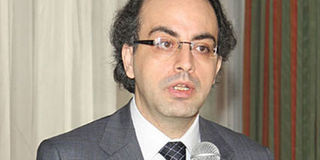Uhuru, Ruto ‘won’t be detained at ICC’

ICC spokesperson Fadi El Abdallah during a workshop in Nairobi March 27, 2012. President Kenyatta and his deputy William Ruto will not be detained at The Hague when their trials start. FILE PHOTO
What you need to know:
- This assurance was made Wednesday by the International Criminal Court Spokesman Fadi El Abdallah in his latest edition of “Ask the Court’.Asked why the ICC rejected Mr Ruto’s request to hold hearings in Kenya or Tanzania, Mr Abdallah said: “The judges were in principle in favour of bringing the hearings closer to the affected communities but they took a vote which did not reach the two thirds majority required to temporarily change the seat of the court.”
President Kenyatta and his deputy William Ruto will not be detained at The Hague when their trials start.
The two as well as former broadcaster Joshua Arap Sang will be free to return to the country when the court is not in session.
This assurance was made Wednesday by the International Criminal Court Spokesman Fadi El Abdallah in his latest edition of “Ask the Court’.
The trial of Mr Ruto and Mr Sang is scheduled for September 10 while that of Mr Kenyatta is on November 12.
Yesterday, Mr Abdallah said no arrest warrants had been issued against the three as they have consistently cooperated with the court.
He said Mr Ruto would, however, be required to attend all the court sessions until a decision is made by the Appeals Chamber on whether he should be excused from attending some of the proceedings.
Mr Abdallah could not state if there would be breaks during the trial.
“The ICC judges have not established the full schedule of the hearings. At this stage we cannot speculate on the continuous hearings or the duration of the breaks,” he added.
Asked why the ICC rejected Mr Ruto’s request to hold hearings in Kenya or Tanzania, Mr Abdallah said: “The judges were in principle in favour of bringing the hearings closer to the affected communities but they took a vote which did not reach the two thirds majority required to temporarily change the seat of the court.”
He added; “The judges also considered lots of other factors like the impact of the security on witnesses, impact of the way the ICC is perceived, the capacity of the court to conduct other proceedings related to other cases and how long the hearings will take. There was no sufficient majority to move the cases in the vote.”





